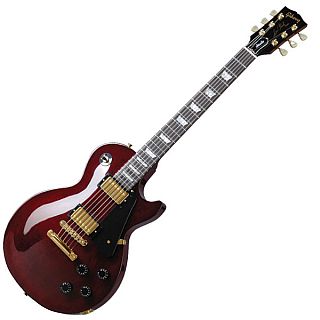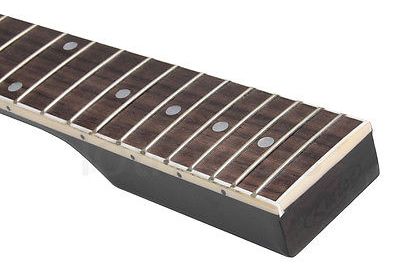| SUPPORT |
TERM
|
LIMITS |
| My Humble Opinion |
|

 Les Paul Electric |
 Hummingbird Acoustic |
Gibson Guitars purchase ebony, rosewood and mahogany from India and Madagascar to be used as fret boards for their guitars. Both India and Madagascar have protectionist labor laws making it illegal to export an exotic wood "log" or "raw" wood so the woods must be "finished" domestically by local workers. Gibson makes several different guitar models, each having fret boards of unique size, width, length and height, characteristic to the specific instrument model. These fret boards are custom trimmed, milled, and slots cut for the installation of the actual metal frets, or "finished" by Gibson during the manufacture of each individual guitar. The precision required for each particular instrument is critical. To expect that fret boards can be “finished” overseas and shipped to the USA for binding to an instrument’s neck without modification is absurd. Unless you do not know what a guitar is, it doesn't take a genius to understand that.  There are no other means to fit a fret board to a guitar neck. Because that is the ONLY way it can be done, that is the way it will continue to be done even after the settlement. Nothing will change. India understands that and sent a letter to our Justice Department stating Gibson broke no India laws with their purchase of exotic woods which the Justice Department ignored. Madagascar, stopped exporting wood to Gibson years ago and refused to send a similar letter stating they did not wish to get involved in Gibson's domestic political problems. Because no laws in India or Madagascar were broken, and Justice did not wish to miss a payday, Justice charged Gibson with violation of the Lacey Act of 1900, As Amended, for importing "raw" exotic woods and "finishing" the raw woods here. Gibson chose to settle the matter by greasing the government palms with $350,000 and forfeiting the $262,000 in exotic woods, plus several finished guitars, seized during the raids. Gibson wisely determined the fines were cheaper than to spend millions of dollars defending themselves against a litigant with thousands of attorneys and bottomless pockets with access to trillions of dollars they can simply print just to insure victory on this matter. Or any other matter they wish. The Justice Department found a loophole in the Lacy Act and used it to their advantage. Final score: Government 612,000. Gibson 0. But, here are a couple of matters I don't understand: Why did Obama’s Justice Department feel it was necessary to conduct not one, but two, hostile raids on Gibson’s manufacturing plants with their officers dressed in full SWAT uniforms and armed with drawn and loaded automatic weapons in their hands? Gibson does not manufacture bombs, drugs, moonshine or counterfeit $100 US bills. They make guitars. Couldn’t they have simply directed an auditor or investigator, wearing a coat and tie to conduct an inquiry? Gibson has been in business since 1902, 110 years, and has never murdered one American citizen or federal agent. These raids terrorized the American factory workers, shut down the assembly and production, confiscated $262,000 of exotic fret boards and seized fully completed guitars. Was this violent show of force really necessary? Why should our government expect American manufacturers to comply with the labor laws of foreign countries? They simply purchase products from a legal foreign manufacturer, exporter or retailer to be used as a component for assembly of an American product. Gibson has no factories, workers or agents in Madagascar or India and have no need or reason to be aware of local labor laws. Foreign countries have no USA mandated laws or trade requirements to advise Gibson, or anyone else, of what their labor laws are or what alterations have recently been made to them. These Gibson raids imply our government holds that American business must be aware of foreign nation labor laws, environmental laws, safety and health protection laws, trade laws, energy laws and any other laws or court rulings that could possibly affect the manufacture of American products containing components purchased abroad. This seems just a little unreasonable to me. The Lacey Act of 1900 should be looked into. What did the government do with the exotic woods and finished guitars they seized from Gibson during the raids? They did not, and will not, return them to Gibson. Perhaps I am a little cynical, but I envision a very nice musical bonus for some lucky musical EPA bureaucrats. Why did the government target Gibson? Gibson builds guitars that are preferred by professional musicians and novices throughout the world. I personally own a Les Paul Studio. Other famous American manufactures of prominent guitars include Martin, Taylor, Fender and others. They too, utilize the same exotic woods they purchase in the same manner, from India and Madagascar. But . . . they were not raided. I wonder why? The only difference I can see between those companies and Gibson is that those companies are union shops. Gibson is not. Those companies, and their unions, contributed over $35,000 to Obama’s 2008 presidential campaign and the Democrat National Committee. Gibson did not. Gibson did contribute $3,500 to Republican candidates. But certainly, that would have no bearing on Obama’s Justice Department decision for the raids. . . Would it? Finally, all guitars labeled “Gibson” on the head are manufactured in America. American labor. American taxes. An iconic American product. They are expensive. Prices at major retail stores range from $600 to $20,000. If you wish to purchase a vintage collectors model, be prepared to spend several hundred thousands. To accommodate the beginners, and the less affluent market, Gibson also manufacturer’s excellent products in other countries including Japan, China and South Korea under the brand name Epiphone and several other branded models. Gibson already has established factories, production facilities, offices, licenses and employees in those countries and others. There is no reason Gibson could not simply pack up and leave Nashville, Memphis and Bozeman, Montana, and take their quality control team, and other special higher skilled staff overseas and not have to worry about political persecution, EPA, the Justice Department, and the US Fish and Wildlife Department. I would be amazed if the CEO and owner, Mr. Juszkiewicz, has not given that a moment, or two, of reflection. When will our government understand that armed raids similar to these, and other acts of political terrorism are among the particulars American corporations take into consideration during their decisions where to establish their new, or expansion, manufacturing plants? It does not have to be in America. That’s the way I see it. David 08/22/12 |
Nation Visitors Since March 8, 2013